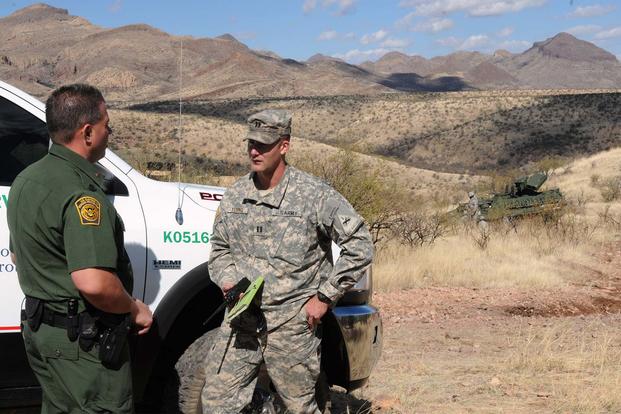The Department of Homeland Security seeks to combat any number of threats, from lone wolf terrorism and installation defense to infectious disease and cyber intrusions.
But the threat most discussed during a panel at this week's Association of the United States Army annual conference in Washington, D.C., was the war on drugs.
Col. Mike Adams, director of operations, plans and training for Joint Task Force-North at U.S. Northern Command, said officials are looking at ways to leverage military training along the U.S.-Mexico border to help stem the narcotics flow.
A memo signed by former Defense Secretary Chuck Hagel encourages the services to conduct "training along the southwest border and provides incidental support to law enforcement," Adams said. Despite an associated funding stream, the many authorities involved created "very detailed challenges associated with that," he added.
Adams was one of several officials who participated in the forum.
Others included Brig. Gen. James Blackburn Jr., deputy commanding general of operations, U.S. Army North; Col. Celestino Perez Jr., deputy chief of staff for plans for U.S. Army North; Chief E. Erik Moncayo, operations section, Joint Task Force-West, Department of Homeland Security; Chief Jesse Shaw, U.S. Border Patrol; and retired Navy Rear Adm. Donald Loren, former deputy assistant secretary of defense, Homeland Security Integration.
While the task force already complements federal law enforcement agencies in counter-drug and countering transnational criminal organizations' activities, it's considering ways to train multiple agencies together, similar to what the Air Force is doing in Southern Command.
Last month, Air Force Secretary Deborah Lee James said the service is looking for ways to use more assets in the Southern Command region that would be "of training benefit to our forces, but also contributing to counter drug and counter transnational crime commission."
For some, the training boost can't some soon enough.
Some audience members expressed concern for the increase in drug use across the U.S., especially the rising heroin epidemic.
"What we've learned is … you can't force your way on an issue like drugs," Moncayo said. "There's only so much you can do when it comes to seizure, and seizures and interdictions. You have to address the root cause, and sometimes it's a socioeconomic issue, other times it's organizations embedded in foreign countries. And that's where we need those partnerships."
Moncayo said once drug smugglers hit the border, it's pretty much too late. "We have to degrade [the drug] networks in order to make a genuine impact."
Blackburn added, "We don't have a clue how much is coming across the border, how much is coming North, South, East, West. Which makes those seizures, while important, a meaningless major effectiveness because you don't know of what."
The general said the price of some drugs, such as heroin, is going down, "and the quantity is going up."
Blackburn earlier in the panel joked that the problems the U.S. faces at the border will soon be put to bed once there is "a wall" -- a dig at Republican presidential nominee Donald Trump's aspiration to build a wall along the border to keep out illegal immigrants.
But his comments sparked a question from an audience member, a retired Army colonel who didn't disclose his name, but said he served as a mayor of a small town of 16,000 residents in a country struggling to cope with rising heroin overdoses and illegal immigration.
"We don't have the money to pay for" these problems, he said, so my plea "to you is whatever it takes: Stop it. We can argue about whether it's demand-driven, but we know where it comes from."
-- Oriana Pawlyk can be reached at oriana.pawlyk@military.com. Follow her on Twitter at @Oriana0214.





























